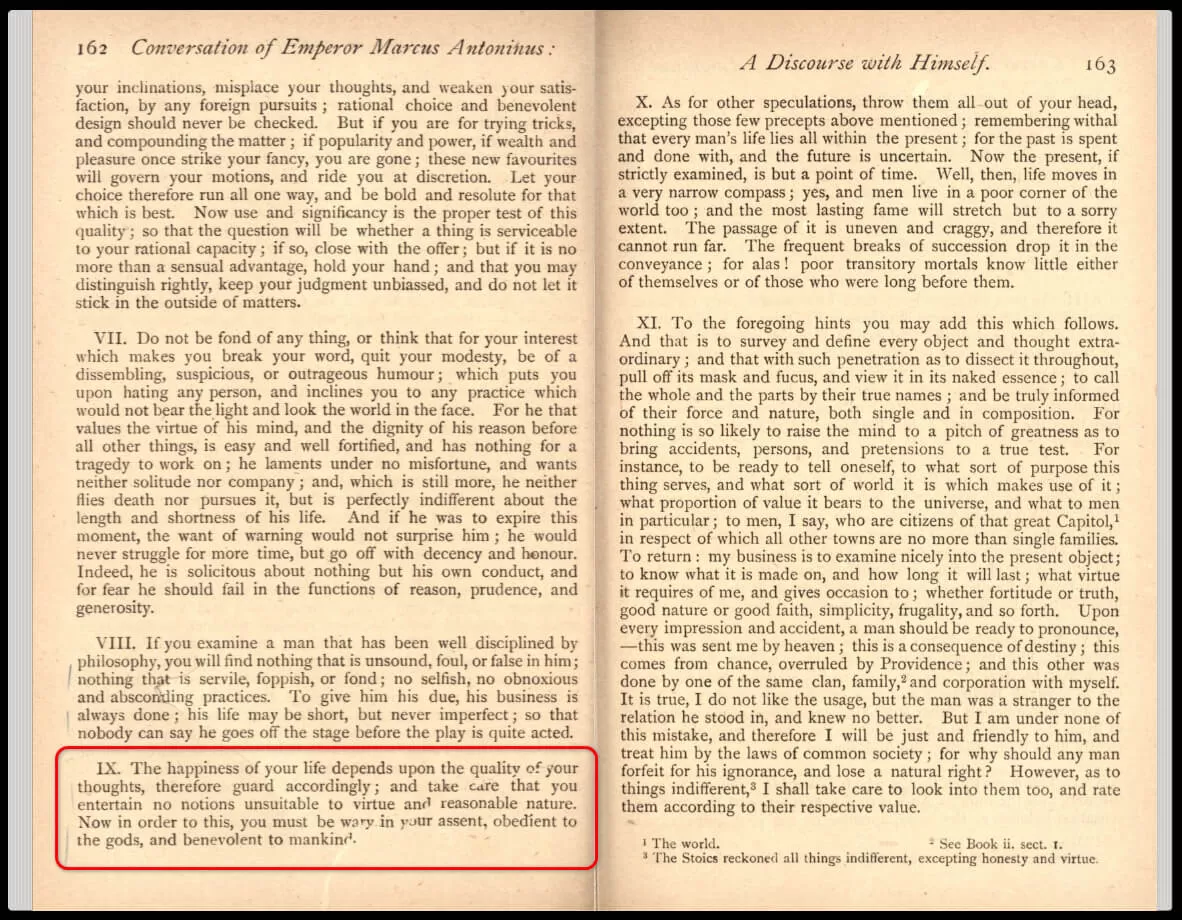Today's Friday • 9 mins read
Marcus Aurelius was not just a great Roman emperor, but also a philosopher of the highest rank. Many call him “The Philosopher King.”
Marcus wrote a series of books called “Meditations” from 170 CE to 180 CE. These contain his self-talks and philosophical reflections on Socrates, Cynicism, and Stoicism. He wrote them as a private journal for his self-improvement and guidance.
Marcus never intended to publish these writings, and they were supposed to have disappeared after his death.
“Meditations” became known to the public several centuries later. Its earliest known manuscript dates back to the 10th century, while the first printed edition was published in 1558 or 1559 in Zurich, Switzerland.
Top 10 Marcus Aurelius Quotes
Marcus Aurelius’ quotes that are widely famous and deeply insightful:
1. The happiness of your life…
“The happiness of your life depends upon the quality of your thoughts.”
— Meditations, 3.9
That quote is present in the 19th-century reprint of the 1701 Jeremy Collier translation of Meditations as:
The happiness of your life depends upon the quality of your thoughts, therefore guard accordingly; and take care that you entertain no notions unsuitable to virtue and reasonable nature. Now in order to this, you must be wary in your ascent, obedient to the gods, and benevolent to mankind. (Meditations, 3.9)

Gregory Hays translates it as:
Your ability to control your thoughts—treat it with respect. It’s all that protects your mind from false perceptions—false to your nature, and that of all rational beings. It’s what makes thoughtfulness possible, and affection for other people, and submission to the divine. (Meditations, 3.9)
Marcus says: Happiness comes from the quality of your thoughts. If you think poorly, you’ll live poorly. If you think well, you’ll live well.
Watch what goes on in your mind, and guard it like it is the most valuable thing you own. Don’t let thoughts that go against Virtue or Reason take root there.
Hays makes this even clearer: Your ability to control your thoughts protects you from seeing the world in irrational ways. This mental discipline makes three important things possible: clear thinking, caring for others, and accepting what fate brings us (amor fati).
2. When you arise in the morning…
Marcus Aurelius never said these words: “When you arise in the morning, think of what a precious privilege it is to be alive–to breathe, to think, to enjoy, to love.”
Redditor Faterson traced that quote to the American writer Elbert Hubbard, who wrote: Epictetus, the Roman slave, and Marcus Aurelius, the Roman Emperor, taught a similar gospel: “When you arise in the morning, think on what a precious privilege it is to live – to breathe – to think – to enjoy – to love!”
The actual Marcus’ quote that comes close is the opening of the fifth book:
“’In the morning, when you find yourself loathe to rise, have this thought at hand: “I am arising to a man’s work. Shall I be annoyed at having to set about the work for which I was born, and for which I was brought into the world? Was I designed for the purpose of lying among the blankets and keeping myself warm?”‘”
— Meditations, 5.1
Gregory Hays translates 5.1 as:
At dawn, when you have trouble getting out of bed, tell yourself: “I have to go to work—as a human being. What do I have to complain of, if I’m going to do what I was born for— the things I was brought into the world to do? Or is this what I was created for? To huddle under the blankets and stay warm?”
Marcus says, when you struggle to get out of bed in the morning, remind yourself that you’re a human being with a purpose and duties. Why complain about doing exactly what you were born to do?
Plants, birds, ants, spiders, and bees do their part without complaint. Like them, we can also find true satisfaction from living according to our nature and fulfilling our purpose.
He challenges those of us who feel it’s nicer in bed: Were you born just to feel nice? Or were you born to act, to experience, to contribute?
3. Love the hand that fate deals you…
“Think of the life you have lived until now as over and, as a dead man, see what’s left as a bonus and live it according to Nature. Love the hand that fate deals you and play it as your own, for what could be more fitting?”
— Meditations, 7.56–57

Marcus means to say:
Consider your past life complete, as if you’ve already died. Now see every moment from this point forward as an unexpected gift. Each day is a bonus that wasn’t guaranteed to you.
Since you’ve been given this extra time, live it in harmony with Nature. Stop fighting against reality. Accept what comes your way.
Marcus gives a perfect example of amor fati, the “love of fate.” Don’t complain about the cards that life hands you. Instead, play those cards as if you chose them yourself.
This mindset shift changes everything. When you embrace your present situation rather than wishing for a better one, you feel grateful instead of feeling entitled.
4. The best revenge is…
“The best revenge is to be unlike him who performed the injury.”
— Meditations, 6.6
Marcus tells himself that if someone were to hurt him, he should not try to hurt them back. He wants to be the better one by acting kindly and not letting the other person’s actions change who he is.
Mahatma Gandhi said about revenge mentality: “An eye for an eye only ends up making the whole world blind.”
5. Waste no more time arguing about…
“Waste no more time arguing about what a good man should be. Be one.”
– Meditations, 10.16
The quote urges us not to waste time talking about how to be a good person, but rather to focus on our actions to be better versions of ourselves.
Marcus asks us to stay good and keep growing, rather than criticizing others or making superficial judgments. He implores us to live a life that reflects our values.
A modern quote that comes close is by Steve Jobs: “The only way to do great work is to love what you do.”
6. Accept the things to which fate binds you…
“Accept the things to which fate binds you, and love the people with whom fate brings you together, but do so with all your heart.” – Meditations, 6.44
In Robin Hard’s translation, it appears as:
If the gods have taken counsel about me and what must happen to me, they have taken good counsel; for a god who makes ill-advised decisions can scarcely be imagined, and what motive could possibly impel them to do me harm? (Meditations, 6.44)
The quote emphasizes embracing the circumstances and relationships that life presents us with, wholeheartedly and without resistance. We should embrace the life we have, including the people in it, and love them without judging them.
7. It is not death that a man should fear…
“It is not death that a man should fear, but he should fear never beginning to live.”
– Meditations, 3.1
Gregory Hays puts it as:
So we need to hurry. Not just because we move daily closer to death but also because our understanding—our grasp of the world—may be gone before we get there. (Meditations, 3.1)
The quote asks us to focus on truly experiencing life and stop living in the fear of death. Death is inevitable, so why waste time worrying about it? Instead, why not get busy fulfilling our purpose in life?
8. The soul becomes dyed…
“The soul becomes dyed with the color of its thoughts.”
– Meditations, 5.16
Gregory Hays says it:
The things you think about determine the quality of your mind. Your soul takes on the color of your thoughts. (Meditations, 5.16)
Marcus means that our thoughts affect our inner self, and over time, they can change who we are. When we think good thoughts, we create a kind and good self.
9. If it is not right, do not do it…
“If it is not right, do not do it; if it is not true, do not say it.”
– Meditations, 12.17 (paraphrased)
Robin Hard puts it as:
If something is not right, do not do it, if something is not true, do not say it; for you should keep your impulses under your own control. (Meditations, 12.17)
Marcus asks that before you do or utter anything, make certain that it is both correct and true. This will help you become a more honest and responsible person.
In C.S. Lewis’ immortal words:
“Integrity is doing the right thing, even when no one is watching.”
10. In no great while you will be no one…
In no great while you will be no one and nowhere, and nothing that you now behold will be in existence, nor will anyone now alive. – Meditations, 12.21
Marcus Aurelius reflects on the impermanence of life and the inevitable passage of time. He tells us that one day, rather too soon, we won’t be here, and neither will the people and things we see now.
He reminds us that life replaces old things and people with new ones. By accepting this, we can learn to appreciate what we have now and understand that our time is precious.
Final Words
Marcus Aurelius ponders death most beautifully in the final quote in “Meditations”:
“Yes. This will be a drama in three acts, the length fixed by the power that directed your creation, and now directs your dissolution. Neither was yours to determine. So make your exit with grace—the same grace shown to you.”
– Meditations, 12.36
√ Also Read: Did Marcus Aurelius say, “Death smiles at us all?”
√ Please spread the word if you found this helpful.
» You deserve happiness! Choosing therapy could be your best decision.
...
• Disclosure: Buying via our links earns us a small commission.
